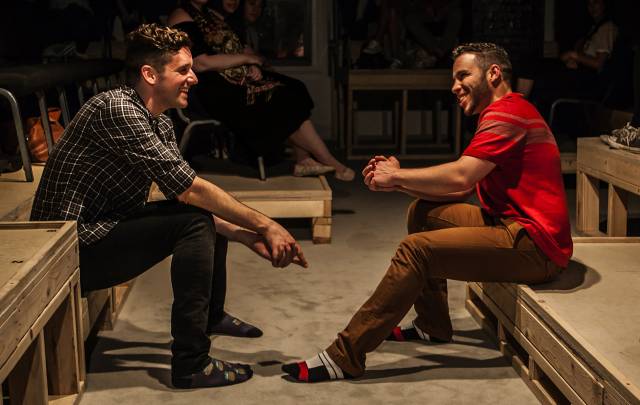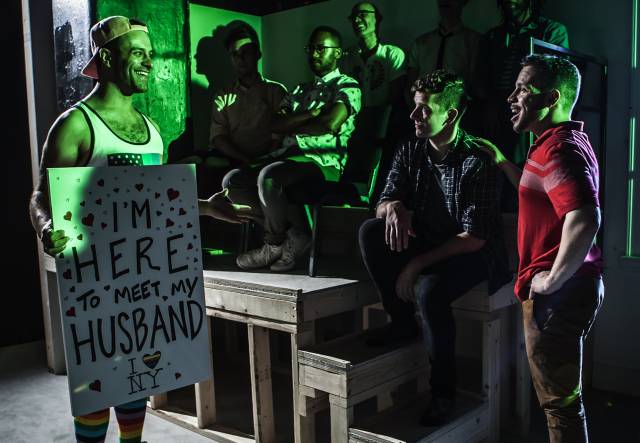

Remember the days when homosexuality was used as a plot twist, and coming out was the entire axis upon which entire shows revolved? Those days are, for the most, happily over and we are now seeing productions in which gay characters are simply, well, characters. Jordan Seavey’s incisive Homos, Or Everyone in America for instance, looks at the intersection where human beings must be confronted with labels which they don’t feel apply to them anymore. The plot centers on the relationship between two men, a writer (Michael Urie) and an academic (Robin de Jesús), as they go through the ups and downs of being together; when they’re suddenly reminded that progress sometimes incites those who fear change to lash out violently. Talk about a play that seems tailor made for the uncertain times that lie ahead.
If the play is significant for the honest, often brutal, way with which it deals with hate crimes, it’s also a unique showcase for the actors who embody characters who just “are”. We don’t doubt that these people existed before we arrived to the Bank Street Theater, and their humanity is such that we feel we might run into them as we go out into the night once the play ends. I spoke to Robin de Jesús about how the play challenged him, the importance of art in dark times, and what the audience can bring to a show like this.
When you took on the project there were many elements of the show that seemed extracted from a nightmare we were putting behind us, now we have a new reality and the show might in fact be more relevant than ever. Do you remember your thoughts upon first encountering the project, and have they changed now?
When I first read the script I thought it was the hardest thing I’d read (laughs) because of the structure there is no punctuation, it’s almost like reading poetry, so a lot of the lines would end mid-thought because the characters find a better way to say what they meant to say, or want to follow different paths. Often it was like two different characters carrying two completely different conversations, so it felt almost like a tennis game. But somewhere in it, suddenly it all made sense, and once I was able to stay in the story I was captured by its beauty, it’s so raw. Everything became clearer as I continued reading it and I realized I knew these people, I’ve been them before. At the end I was punched in the gut and so moved by the story. There was something similar to nostalgia, in the scenes set in the past, that made me think of all the things I’ve gone through and maybe I’ll go through again.
This whole election I’ve been so naive, I’m angry at myself because I realized I’ve been complacent. I thought Hillary was such a shoo-in, I never thought there’d be so many silent voters out there, I thought the Hispanic community would make a difference. I’m shocked, but I’m also very much aware that this play, and many others, are here at this reason for a time. Jordan had been trying to get this produced for a few years now, and I like to believe it’s not a coincidence that it’s happening now and happening at Labyrinth. This theatre company stands for so many of the things the play deals with. I think regardless of who won there would have been violence, and I think the people who are committing crimes now are also the victims of ignorance.
It’s hypocritical how politicians can get sent to “sex rehab” but no one gets sent to “racism or misogyny rehab”.
No one teaches empathy, we’re all suffering from that.
The play hit very close to home because I was also victim of a hate crime and I found your performance so accurate and sensitive. How was it like for you to go into this character?
I think I protected myself in a way. This is the second time I’ve played someone who was victim of a hate crime, a few years ago I played a post-op transgender woman - to be honest it wasn’t specified in the script if she was post-op, but I think she was - and I remember during that time period diving into the world of transgender people, hearing about their struggle and what they’ve been through. Even though I only had one scene in the play it was important for me to do this, on paper that scene looked comedic and I did not want it to be that, I felt it would’ve been disrespectful to the character. Doing my research I was being masochistic, taking on a lot of weight as if I had lived this character’s life, in the scene I had to make my case to a man who didn’t take me seriously. At the end of the scene my character gets violent. For Homos, I felt there was already weight in the play and I wanted to protect Robin the actor, cause if I didn’t protect myself I wouldn’t have been able to protect the character. In this play I try to imagine things, I can’t even imagine what it must be like to be victim of a hate crime. The week after the election has been very different and really hard, there have been certain scenes that feel scary in a way they weren’t scary before. There are times when I feel scared onstage and I have to kick Robin out of the room.
Is it hard to play scenes in the past without letting future scenes affect the character at the moment? Do you have a formula for this?
It’s called leap, fucking jump, and pray for the best. We did a lot of text work on the show, we sat with the script for a week and worked on it in chronological order. This allowed us to create notes, the script doesn’t have dates for instance, but we know. I know what happens three and nine months into the relationship in the play. Once you do all that work it becomes muscle memory. In previews we changed the flash forward scenes and that was a mindfuck, but this whole play is vulnerable and courageous as fuck. You can’t let fear hold you back, the emotion is so raw that we might as well be naked onstage. We have no time to hesitate, if we do we miss something, the next scene will already be happening. This has been very freeing, as someone very heady, this play has been a blessing because it won’t let me engage in that. In the past I’ve let my ego come in, trying to be too much of a perfectionist, but in this I can’t engage in that conversation with myself. This play has made me more present.

There are two things about the audience in the production that are very interesting. First you are so close to the audience that we are forced to develop empathy, we can’t look away because you’re sitting next to us. The other thing is the show demands an audience willing to follow the plot and become very active, this isn’t a show where they can doze off and pick up.
I love that you used the word “empathy” because that’s been my word for the past year. I never thought of it that way and it’s beautiful. I think the goal in having the space be so close and tight is to bring out the vulnerability, to make us go there. Since the plot isn’t chronological, we zoom in on specific points that make the story more fascinating. Having the audience that close feels like a bedroom, a lot of the conversations my character has with Michael Urie’s are private, the kind you have at home with your partner. I think it also makes many audience members uncomfortable, not in a bad way, but there are times when I’m doing a scene next to someone and a lot of times people can’t look at us. I’ll have people who will look straight ahead and not at me, these are the same people who will laugh or cry in other scenes, they’re not lacking in interest, they just don’t want to be vulnerable. There are certain seats in our theater where you are there with us. The day after the election it was too difficult for an audience member, this same person was then holding his partner’s hand and crying. He was in self-defense mode because life, the play and politics were just too real.
That’s tough.
The space is amazing, on a technical level I wanna mention that since we’re not amplified, audience reactions affect what we hear from the other actors. They inform our speed, but there are times where we can’t stop. Since the audience is around us in every direction we need to plow through otherwise the next line might make no sense, we need to negotiate where the audience has their moment. That’s been so fascinating, Michael and I talk about how the play is never boring, because there is always so much life in it.
I keep describing the show as The Way We Were with queer people of color.
That’s amazing, we had an audience member, sitting with a group of students, who was sitting in the front jotting notes. Our director wanted to see what he was writing and at one point he read he wrote “why are they both white?” He thought I was white, in his eyes the play wasn’t as diverse as it actually is.
Let’s end on a musical note! What is your all time favorite Stephen Sondheim song? And which of his characters would you love to play?
That’s so easy, hands down, all day every day George from Sunday in the Park with George. I know I’m not a traditional Seurat but when I was looking for inspiration and ways to open my emotions preparing for this show, Sunday kept coming up. I went down YouTube holes watching videos of Mandy Patinkin and Julian Ovenden, who has this gorgeous freaking voice. My favorite song…”Move On” always gets me, if we’re talking about music/lyrics, but if we’re talking just lyrics “Somewhere” is the jam. It’s so good! I love “Somewhere” in the context of the show, with jazz singers, with R&B singers! That song is so malleable, its message is so powerful and the way it escalates is just thrilling.
Homos, Or Everyone in America runs through December 11. For tickets and more information click here.